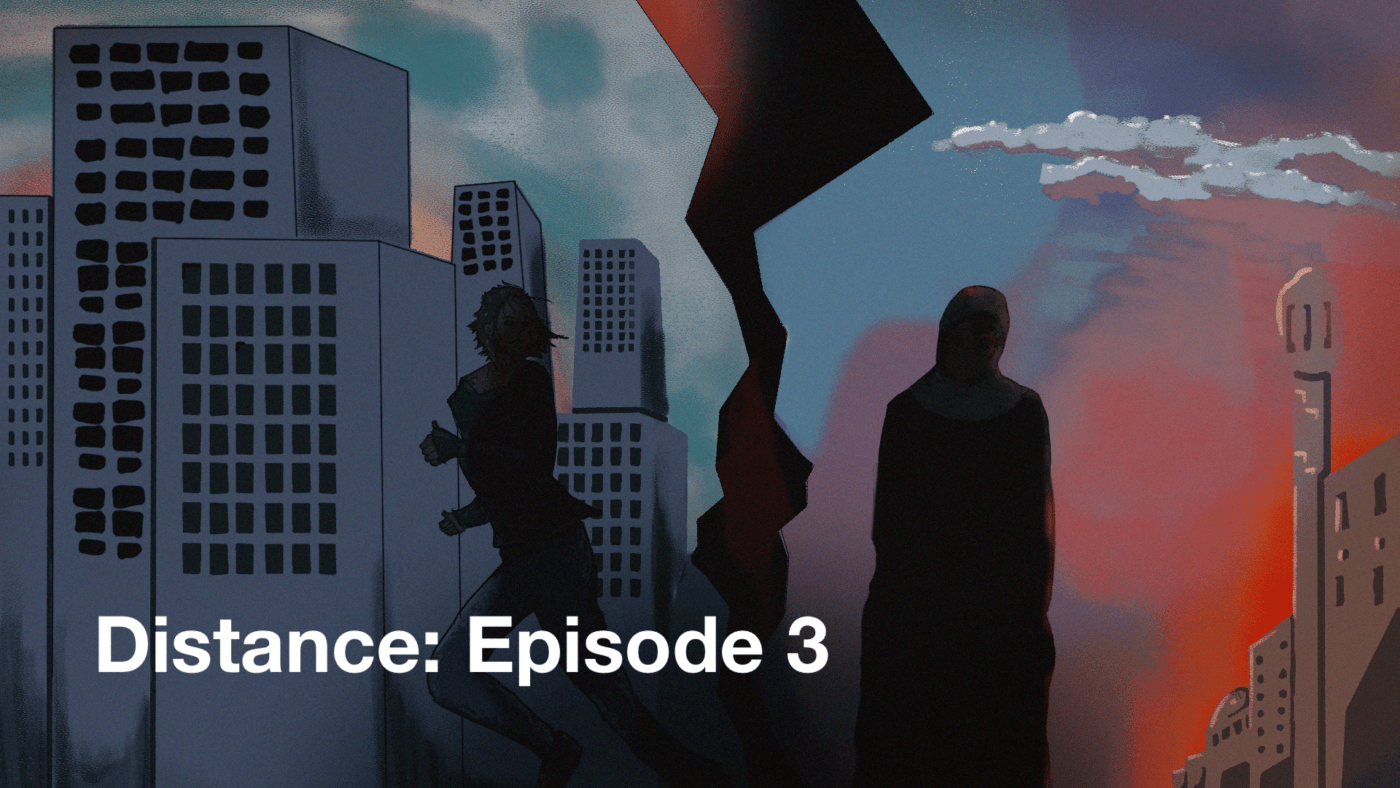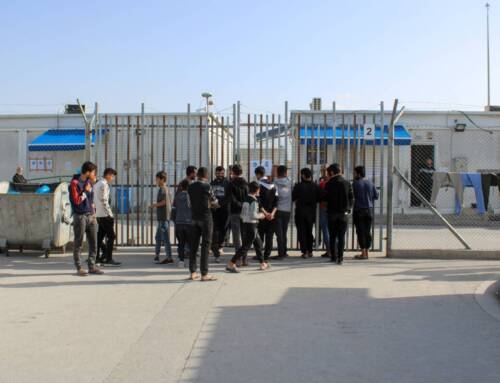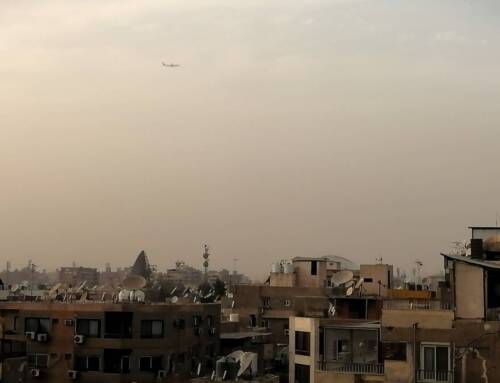Distance (Episode 3): ‘What kind of country did I choose?’
When Nisrine and her family made the decision to flee Lebanon for Denmark in 2015, there was a snag: Her 12-year-old daughter Nadine had to return to Syria to get a passport. The border closed, and Nisrine made the painful decision to leave her behind—temporarily, she thought. Seven years later, she is still fighting to reunite with her.
30 January 2023
Length: 17 minutes
A last minute passport mix-up forced Nisrine to leave her 12-year-old daughter Nadine behind in Syria while she fled with her two sons to Denmark in 2015. Once there, she was told she had to wait three years to apply for family reunification. Three years later, Nisrine’s application was rejected because she had subsidiary protection, not asylum. Then, Nadine fell severely ill.
Danish migration authorities have not budged, and neither has Nisrine—who finally received asylum this year, and is still fighting to reunite with her daughter.
This is the third episode of “Distance,” the second season of Syria Direct’s podcast “Qayd.” This series tells the story of Syrians who reached safety in Europe and applied for family reunification, but fell through the cracks of asylum rules. It is also about those they left behind.
This podcast was produced by Alicia Medina and edited by Mateo Nelson, with illustrations by Rami Khoury, and a soundtrack by Eli Ishac and Carol Abi Ghanem. It was narrated by Alicia Medina, with dubbing in English by Samer Dada, Ola Muchref and Fadia Akli. This series was produced with financial support from the European Endowment for Democracy (EED).
All episodes of “Distance” will be available on SoundCloud, Spotify and Google Podcasts.
TRANSCRIPT:
NISRINE: My daughter was young, she needed me. She faced danger more than once in Syria.
NADINE: I haven’t seen her in six years.
(MUSIC)
NISRINE: Denmark had the fastest family reunification process.
NADINE: Can I go to my mom?
NISRINE: They wronged me and my family.
(MUSIC)
ALICIA MEDINA (HOST): This is Nisrine, and her daughter Nadine, whose name we have changed for security reasons. Eight years ago, Nisrine traveled to Denmark, hoping to bring her then-12-year-old daughter later, via family reunification. Denmark rejected her request. Then, Nadine fell ill.
This is the third episode of “Distance,” a podcast by Syria Direct. This series explores how Syrian families have navigated years of separation after they received asylum or another protection status, but were denied family reunification.
What happens when the plans of a mother to unite with her children, or a wife with her husband, never materialize? What happens to those who get left behind?
This is a story of those who fall through the cracks of European asylum systems.
(MUSIC)
MEDINA: In 2012, Nisrine and her husband —who worked in construction—were living in the Damascus countryside. They had three children: nine-year-old Nadine, and two sons: a five-year-old and a one-year-old.
NISRINE: When war broke out, those days were hard. Airplanes, shelling, raids on houses.
MEDINA: That year, Syrian regime forces detained Nisrine’s husband and his three brothers.
NISRINE: They entered the house and detained him together with his three brothers. My husband and his brothers are still missing.
MEDINA: In 2018, Nisrined received her husband’s death certificate. It said he was executed in 2013 in Saydanya, a military prison notorious for the use of torture where thousands have been extrajudicially executed in mass hangings.
The same year her husband was executed, Nisrine fled with her three children to Lebanon, but they didn’t stay long. Some of their relatives decided to go back to Syria in October 2014. Nisrine stayed in Lebanon, because she wanted to flee to Denmark. But a miscalculation would split her family in two.
(MUSIC)
MEDINA: In late 2014, Nisrine, her three children and her father-in-law were ready to set off on the risky journey to Denmark. But they realized that Nadine’s passport—she was 12 at the time—was missing. Nadine traveled with her grandmother to Syria to get a new one and come back, but they got stuck in Syria.
NISRINE: They traveled to Syria to take the passport and travel with us. The borders between Lebanon and Syria closed. No one could enter or exit. And we already bought the plane tickets.
MEDINA: Lebanon, which hosted more than one million Syrian refugees at the time, closed its borders with Syria at the end of 2014—just when Nadine went back to get a new passport.
Nisrine decided to go ahead with her plan. Once in Denmark, she thought in a matter of three months she could bring her daughter.
NISRINE: I took my sons with me and left my daughter behind. The idea was to do family reunification quickly. Denmark had the fastest family reunification process.
MEDINA: The family paid $12,000 to cover their trip: a flight to Jordan and then to Algeria, crossing the desert towards Libya, where they were treated poorly by smugglers.
NISRINE: Beatings and yelling. ‘Quick, hide!’ No going out during the day, and so on. They dehumanize you, they treat you like an animal.
MEDINA: Then, Nisrine, her sons and father-in-law took to the sea, hoping to reach Italy.
NISRINE: It was night, very dark, you couldn’t see anything. The Libyan police caught us. They lined us up against the wall and put guns to our head, threatening to kill us. My sons started crying, that night was hard. Later they let us go and we escaped. The smuggler took us out into the sea at night
MEDINA: In 2014, 3,500 people died trying to cross the Mediterranean Sea to Europe on the same migration route Nisrine took from Libya.
But on their second attempt, they were lucky. After 22 hours at sea in a boat with 400 people, the family was rescued. Once they reached Italy, they crossed through Greece and Germany, and, finally, reached Denmark.
(DANISH NEWS CLIP DISCUSSING REFUGEES)
MEDINA: Nisrine arrived in Denmark in January 2015. That year, 21,000 refugees entered the country, marking a peak in refugee arrivals. In response, the Danish authorities tightened asylum rules to make their country less attractive. The new rules would tear Nisrine’s family apart.
Denmark introduced a new temporary protection status (7.3), mostly given to Syrian refugees. The status applies to those who do not have an individual asylum claim but fled because of the general situation in their country. If the authorities later deem your country to be safe, you lose this protection.
Nisrine, despite having a husband and several family members forcibly disappeared by the Syrian regime, did not receive asylum, and was granted temporary protection instead.
NISRINE: As soon as I arrived, I started the family reunification paperwork. But when I got the 7.3 residency, a law was passed saying that you have no right to do family reunification if you have 7.3 protection, until you have spent three years in Denmark. You have to wait for three years.
This didn’t stop me. Every year I was rejected, and every year I reapplied.
MEDINA: This three-year waiting rule was another way of making the country less attractive to refugees. Nisrine was among the 4,000 people who had to wait three years before applying for family reunification.
Denmark is one of five European countries that introduced mandatory waiting periods of two-to-three years around the same time. In 2021, the European Court of Human Rights ruled that Denmark’s three-year waiting period violated refugees’ right to family life, Article 8 of the European Convention on Human Rights. In response, Denmark reduced the waiting period to two years.
The three-year waiting period shattered Nisrine.
NISRINE: I got sick. For a month I stayed home and I didn’t talk to anyone. Every time it felt like a new shock. My daughter was young, she needed me. She faced danger more than once in Syria. I contacted migration authorities and told them that, and they said: ‘You have to wait, you have to wait.’ There’s no mercy. No humanity. I came to a country with human values, but that humanity is only on paper.
MEDINA: For her daughter, it was hard to understand why she couldn’t join her mother and brothers.
NISRINE: She was young, she didn’t understand what I was telling her. She only understood that she had to come to live with us. She didn’t understand.
MEDINA: In 2018, when the three-year wait ended, Nisrine applied for family reunification yet again. She was rejected, even though her daughter was 15, still a minor.
NISRINE: They said she could live on her own, without her mother. The reason was that I only have a one-year residency in Denmark. I still have all the rejection papers.
MEDINA: Nisrine’s subsidiary protection didn’t qualify her to bring her daughter. Denmark is one of 15 European countries that have limited rights for subsidiary-temporary protection.
(MUSIC)
Then, in 2019, Nisrine’s right to stay in Denmark was threatened. That year, Danish authorities started revoking hundreds of Syrians from their residency permits on the grounds that Damascus and the Damascus countryside was safe for returns. Nisrine was among them.
NISRINE: They said ‘Damascus is safe and you have to go back’. I took all my documents, my husband’s death certificate. I went to the interview, and I explained my situation. But they rejected me.
MEDINA: Denmark is the only European country forcing Syrian refugees to leave their territory—or live in a deportation center indefinitely—on the basis that they can safely return to Syria. Nisrine appealed her case.
NISRINE: As a family opposed to the regime, we can’t return to Syria. My husband was killed by the criminal Bashar al-Assad, executed in Sednaya prison. We won’t go back to the same regime that killed my husband and his brothers.
MEDINA: As Nisrine fought to stay in Denmark, back in Syria Nadine fell severely ill.
NISRINE: She had meningitis, with a severe fever. It caused limb paralysis. She lost movement in her hands and legs, and some of her ability to speak. She needs a walker. She can’t go to the toilet on her own, she needs someone to help her.
MEDINA: Nadine, now 20, still speaks with difficulty due to her condition. In a call from Syria, she described what she remembers from when she got sick.
NADINE: I was mentally exhausted, I got sick, I suffered brain inflammation. The first time I went to the hospital, I fell into a coma. I was unconscious for a month.
MEDINA: Nadine was transported from Syria to Lebanon for medical treatment. Through the Red Cross, Nisrine and her two sons were allowed to travel to Lebanon in October 2019 to stay with Nadine for a month.
NADINE: When we visited her when she got sick, and they saw her sister. They treated her like she was a small child, that’s how they treated her.
MEDINA: Under Danish law, those with the 7.3 protection could still get family reunification in exceptional circumstances, like a sick child. But according to the Danish migration website, “this is very strictly administered.” Nisrine sent medical reports to Danish authorities, and applied for family reunification again. She was rejected.
After a month in Lebanon, Nisrine and her two sons returned to Denmark. Nadine was left behind again, and went back to Syria with her relatives.
NADINE: I said goodbye to them. For a while, I cried and was upset. I was very tired, physically and mentally.
MEDINA: For Nisrine, living in the safety of Denmark while her daughter was in danger in Syria was difficult to process.
NISRINE: Her brothers and I, we couldn’t focus on our studies. All of us just wanted to live together. We came to a country of safety and freedoms, so we could live together. That’s all we wanted. We didn’t understand why they were treating us this way.
MEDINA: This sort of guilt became self-censorship when they spoke on the phone.
NISRINE: I don’t talk about our day-to-day lives in front of her. I don’t tell her that I get on the bus, that I have hot water, so she doesn’t feel there’s a big difference between us. I don’t say we have a heating system, while they are struggling to find gas for heating.
MEDINA: Nadine’s condition deteriorated to the point she had to drop out of school.
NISRINE: She used to study, she reached ninth grade. But with her illness it got complicated, and she can’t get out of the house a lot.
NADINE: I didn’t go to school, because with this illness you need a private school, and we don’t have the money.
MEDINA: It is also difficult for Nadine— logistically and economically—to access the medical treatment she needs in Syria.
NADINE: If I need to go to the doctor or physiotherapy, I need someone with me because I can’t walk, I need a wheelchair. It is difficult for us because they have to bring me and take me back, and there’s no one, just me and my grandma.
MEDINA: Nisrine tries to keep in contact with her daughter and her relatives in Syria as much as she can. But constant internet and electricity cuts make it difficult.
NADINE: We video call every day, but sometimes it takes longer. Sometimes there’s no electricity or internet.
MEDINA: On special occasions like Nadine’s birthday, they try to maintain a sense of normalcy.
NISRINE: On her birthday, we’d call her in the morning, sing her ‘happy birthday’. Me and her brothers would make a cake and cut it here, and she was on the phone screen. In all the birthdays and events that we spent like that, when we saw her, she cried from the bottom of her heart. I couldn’t imagine that we were going to be celebrating birthdays like this.
MEDINA: Nadine breaks down when she talks about her mother.
NADINE: There’s nothing like a mother. When she was here she used to pamper and protect me.
(MUSIC)
MEDINA: Nisrine doesn’t mince words when referring to Danish migration authorities.
NISRINE: The Danish migration wronged me, wronged my daughter, and wronged my family with their wild decisions. I wouldn’t wish what we went through on anybody. Many times, I regretted coming to this country. To this garbage system.
MEDINA: In August, Nisrine won her appeal to stay in Denmark. She got her residency permit back, and was granted asylum. Now, she is working with a lawyer to reapply for family reunification, yet again.
NISRINE: I will fight to get a residency permit for my daughter, for her to come and receive medical treatment, because in Syria there’s no treatment, no water, no electricity, nothing.
MEDINA: Despite everything she has gone through, she still sees a future for her family in Denmark.
NISRINE: Our future is Denmark, because my sons are going to school, and my oldest son is working.
MEDINA: Danish policies have made the country less attractive to asylum seekers. They have also torn families apart, including Nisrine’s.
NISRINE: What they have done has a name: breaking families. How do they accept for us to live like this? How do they accept that children are far from their parents at this age? When you are over 18, ok, but before, when she was 12, why did you keep us from each other? She doesn’t have a mom or dad in Syria. I don’t understand—am I in a safe country, or what kind of country did I choose? Where am I? I don’t know.
MEDINA: Nadine’s message to Danish authorities is a question.
NADINE: Can I go to my mom? Can I go to my mother’s house? Like this I could rest a bit mentally. I hope that you help me so I can go be with my mom. I haven’t seen her for six years.







